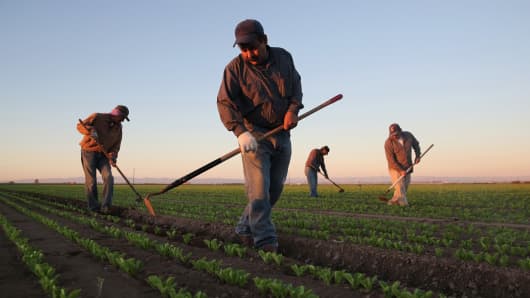There have been several failed attempts by Congress in the past several years to revamp the H-2A program, which allows U.S. agricultural employers to hire foreign nationals to perform temporary or seasonal work. And now the White House's policy to split up migrant parents from their children has ignited a new front in the immigration debate and perhaps another obstacle to getting major reforms to the farm worker visa program.
Another potential hurdle is the possibility the administration may cut back on the number of visas for temporary agriculture workers, which Politico reported Monday could be part of a broader immigration clampdown ahead of the fall midterm elections. There is currently no statutory limit on the number of H-2A temporary agricultural worker visas issued by the federal government.
Scaling back the H-2A program could spell trouble for larger reform efforts designed to help the agriculture industry.
Several industry executives expressed concern about the report of limiting the number of agricultural worker visas and suggested it could potentially hurt farmers depending on how it's done. They also are worried it could represent a reversal of the administration's past pledge to end burdensome policies on farmers.
Farm states where Trump has a strong base already are worried about the impact of a possible trade war with China and uncertainty surrounding the North American Free Trade Agreement with Mexico and Canada. Some experts suggest changes to the H-2A temporary agriculture program that make it more difficult for growers to get farm workers could backfire on the administration.
Last January, President Donald Trump spoke to the American Farm Bureau Federation's annual meeting and promised his administration was "putting an end to the regulatory assault on your way of life." He also spoke about how the industry had been hit by a "relentless intrusion" by a number of federal agencies.
CNBC reached out to the White House for comment.
Trump has rejected comprehensive efforts at immigration reform unless it includes full funding for his border wall and other changes generally opposed by Democrats.
Still, one of the top priorities for the agricultural industry is to create a market-based visa program since there are criticisms the current program needs more flexibility and options for farmers. Despite its flaws, growers around the nation have turned to the H-2A program to find seasonal or temporary help to harvest crops and perform a number of other tasks on farms.
"It's expensive, it's a lot of red tape and you have to be way out in front of your date of need," said Brian Reeves, a partner and co-owner of Reeves Farms, a grower of berries and vegetables just outside Syracuse, New York. "It just complicates your life in a number of ways."
